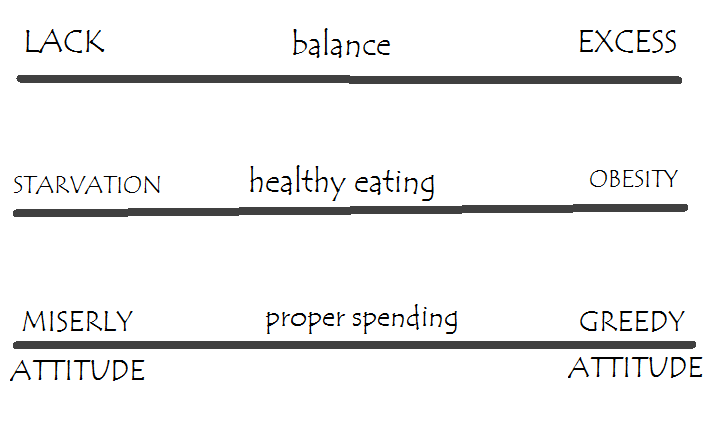If you know me well, you will know that there’s a word, a key element of life, that I uphold and value and pursue (or at least attempt to pursue) in all my pursuits: balance.
Now I’m no dancer nor am I a gymnast or yoga… participant (yoga-er? yog-ist? yoghurt?) but I still find balance to be a key part of life in so many areas. You want a balanced diet. You want a well-balanced mind. You try to balance your schedule and balance your expenses so you are not over-committed or spending too much. We try to find balance in almost everything- but why?
I believe it’s because of the danger of extremes. When we make up hypothetical situations, we tend to use the most extreme situation. For example, in telling your teenager that he or she should not give in to peer pressure, what is the go-to accusative query? “If all of your friends jumped off a bridge, would you go jump as well?!?” Now I guess there might be some thrill-seeking, risk-taking teenagers, probably in California, who like to get together and bungee jump off bridges, but for the most part this is an extreme that shows how ridiculous something, such as peer pressure, can become.

Truly there are shades of extremity. I’d say that a death-by-bridge pact by a group of friends is the extremest extreme. Something that is more realistic would be, for example, a party situation where a group of friends are jumping off a roof into a swimming pool. The extreme is still dangerous, but it is much more likely to happen. It is a good example of an extreme. The opposite side of the issue of peer pressure is the extreme extreme of becoming fully isolated and fearful of being around others, like Howard Hughes, while a more likely extreme is to simply become a distrusting, withdrawn person who does not enjoy the goodness of relationships.
Let’s look at a different issue- eating. Well, our extremes of eating too much or too little are dying of starvation or dying of massive obesity. While those extremes are more likely than bridge jumps, they are still extreme extremes. Though obesity and eating disorders are a prevalent issue in our culture, still only a small percentage of people will shrink down or expand to ridiculous, unhealthy weights. More likely extremes would be the effects of under- or over-eating, such as obsessing over weight loss or becoming inactive due to weight gain. Both of these extremes plague our culture, and they come about because of a lack of balance.
We could draw out a line of extremes with the left side representing LACK of some thing and the right side representing EXCESS of the same thing.
At this point we could make the mistake of placing BALANCE as a point on the very middle of the line, because in doing so we would be setting unrealistic expectations. Now I’m not saying that our goal of balance in, say, expenses shouldn’t be focused. It’s not bad to say, “I want to spend no more than $100 a week on groceries.” However it is pointless to have an exact amount that we hope to spend, like saying “I will spend $78 on groceries every week, no more, no less.” There are so many variables in life: What if a friend comes for a visit? What if prices go up? What if you have less needs one week? What happens when you need to increase or decrease the number as you change and grow? Is it sin to spend $79? Does it have to be $78 exactly? Down to the penny?
You see it’s absurd to place some specific goals in our pursuit of balance. I do believe our ideas of balance should be focused, just not unrealistic. I would say instead of setting a certain amount, set boundaries of expense, for example “I will spend no less than $70 and no more than $100 on groceries each week.” Over time, boundaries can change. You see it all comes down to degrees. Just as their are degrees of extreme there can also be degrees of balance. We try to attain perfection in so many areas of life, but when we define one specific goal as perfection, if we fail to reach that exact goal ,we fail at finding “balance.” We need to be more graceful to ourselves. Graceful but also disciplined. Perhaps my goal of balance is to spend between $70 and $100 on groceries, but I can have degrees of grace so that if I spend $115 or $130 I can forgive myself but also refocus my efforts. now if I spend $250 one week for no reason at all, something needs to be corrected, whether it be my appetite, my greed, or my obsession with stocking up or something else.
So we have degrees of extremes at the left and the right and at the center of the spectrum we have degrees of balance. If a gymnast has correct strength and focus, they can lean over to the right somewhat and still be balanced. As long as our balance is realistic, focused, and strong, we can make mistakes to the right or the left and still come back to our center. And if things get out of hand and we fall off, we just get back on the balance beam.
Anyway, I am saying many things that I have actually never thought out before, but I do believe they are true. We seek balance because we know from abstract thought and experience that extremes are bad and unhealthy. Balance is healthy, proper, refreshing. It’s like tubing down a river– if you go too far to one side you’re gonna get stuck on the shore or stuck on the rocks. But if you stay centered, stay balanced, you’re going to keep going down the river and have a real good time. (Although I have to admit I’ve never been tubing before. Maybe my analogy doesn’t work. Take me tubing sometime and we can try it out!)
So now that I’ve written a whole chapter on the issue (not even!) let me explain the the source of this exploration. For years now (in fact one of my blog post from high school is on this need of balance) I have wanted to write a book about balance in many parts of the Christian life and general human life. Here are a few issues I’ve considered for this book:
– Balance between Care of Self and Self-Sacrifice
– Balance between Humility and a proper sense of self
– Balance between Staying the Course and Going Out where God leads
– Between Wisdom and Trusting God in risky situations
– Between being Childlike and Maturing in our faith
– Between being Informal and Developing Church structures
-Giving Grace and Disciplining Actions
– Acts of Love and Words of Truth
– Accepting Sinners and Hating Sin
Now I realize that these categories aren’t the best. At times I’m forcing two separate concepts into one spectrum of degrees of extremes and degrees of balance. Perhaps being Childlike and Maturing in Faith are two unrelated, non-combative elements of life. This is not a list of chapter titles, but just some topics for brainstorming. I haven’t found many books on the element of balance in the Christian life, though I need to do more research I’m sure. I’m just fascinated by this question, “What does a balanced life look like?” And in defining “a balanced life” I must remember what is balance for one person is not balance for another. Some of us have more degrees of balance than others. Perhaps this is like the issue of “weaker faith” that Paul brings up in Romans. I hope to have strong Biblical basis for this project, and not just a bunch of “I think” statements. And I do believe that the best focus of balance for the Christian life is the very center of existence: the person of Christ.
.jpeg)
In Christ we see a balance of anger towards sin and grace towards sinners. We see a balance of withdrawing for prayer and being out and about serving the multitudes. We see a balance of humility and a proper understanding of self. Now you might argue, “But He’s Jesus! Of course he can be proud of himself. Of course He’s balanced! He could not sin, he never veered into those extremes that we deal with.” I wonder what, then, was the purpose of Satan’s temptation of Christ? Though Christ was tempted, did he not choose to not veer to the left or right, but instead chose what is right? And was Jesus not fully man? Yes, he was fully God as well, but if we are in Christ we are given a new, redeemed Christ-like nature. So when we look at Christ, we look at a life of balance.
Anyway, this is just the beginning of a journey of interest that I have been on for a while already. And maybe tomorrow I’ll find a book on Amazon.com that already perfectly addresses this element of balance. I really hope not, because I look forward to exploring the idea more and more as time goes by. And if you have any thoughts and perspectives, please share them with me that we might benefit from each other’s knowledge, experiences, and ideas. Truly, that is the balance of forming ideas. We don’t want the extremes of completely operating on our own nor simply accepting anything and everything anyone and everyone says. We must find balance even in our understanding of balance. So let’s go for a ride together down the river…




